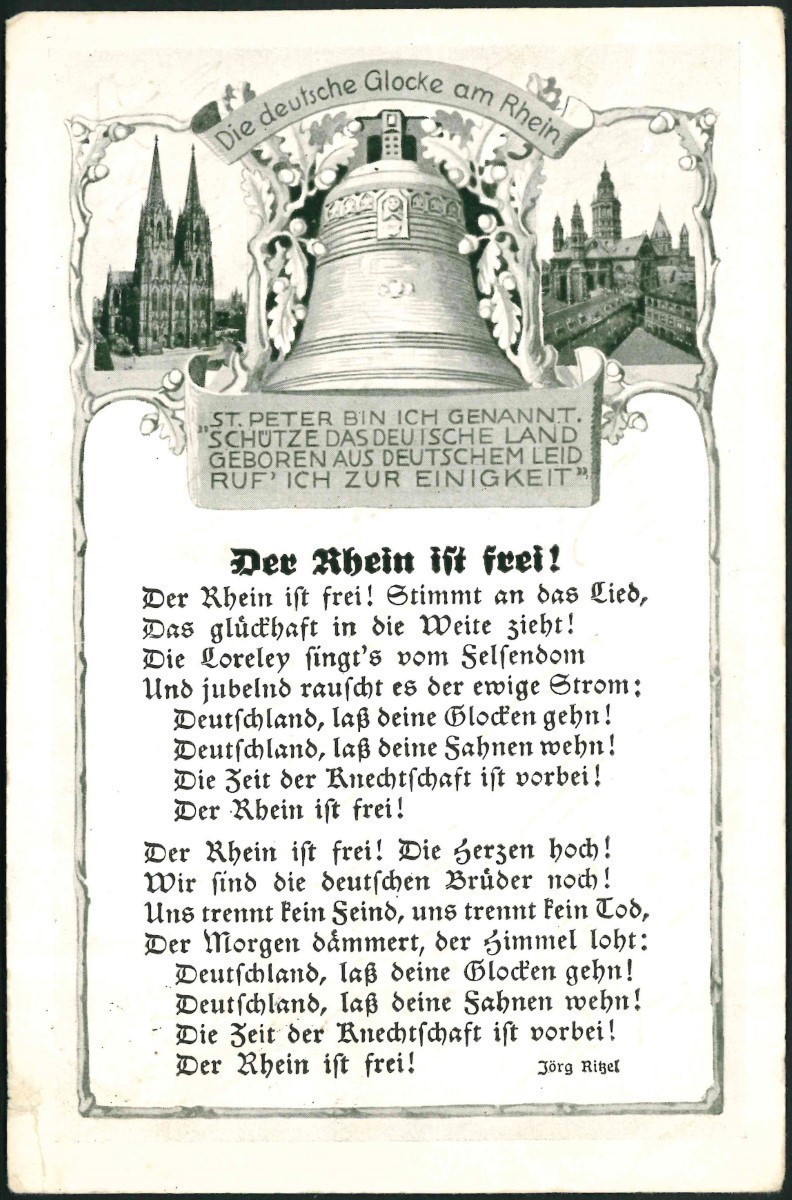PROPAGANDA POSTCARDS
(1930)
This page was last updated
02-Mar-2025 10:59

RHINELAND OCCUPATION ENDS
(Jun 1930)
BACKGROUND: At the end of World War I, the region of Germany known as the Rhineland came under Allied occupation. Under the 1919 Treaty of Versailles, the German military was forbidden from all territory west of the Rhine or within 50 km east of it. The 1925 Locarno Treaties reaffirmed the permanently-demilitarized status of the Rhineland. In 1929, German Foreign Minister Gustav Stresemann negotiated the withdrawal of the Allied forces. The last soldiers left the Rhineland in June 1930.
There were a number of propaganda postcards published commemorating the region's newly found freedom.
SPECIAL CANCEL:

RHINELAND #1
(Jun 1930)
This impressive Commemorative postcard was published by Verlag Webeko of Mainz. It features a person (representing the Rhinelanders) sitting astride the River Rhine and looking hopefully up into the sky where the clouds are parting and the sun is beginning to shine through. The clouds represent the feeling of oppresion felt by the Rhinelanders whilst under Allied occupation, but now that the foreign troops have gone, the future is looking brighter.
The inscription on the reverse reads "Zum Gedenken an die Befreiung des | deutschen Rheines | 1930 | Entworfen und gezeichnet von Theo Matejko" - 'In memory of the liberation of the | German Rhine | 1930 | Designed and drawn by Theo Matejko'.
The two examples below have been postally used. The card on the left has one of the special stamps, Michel 444, that was issued to commemorate the troops leaving, and has been cancelled in Mainz on the 22nd Jul 1930, the month after the troop withdrawal. The card on the right was cancelled in ELTVILLE on 27th Jun 1930 but does not have the commemorative stamp.



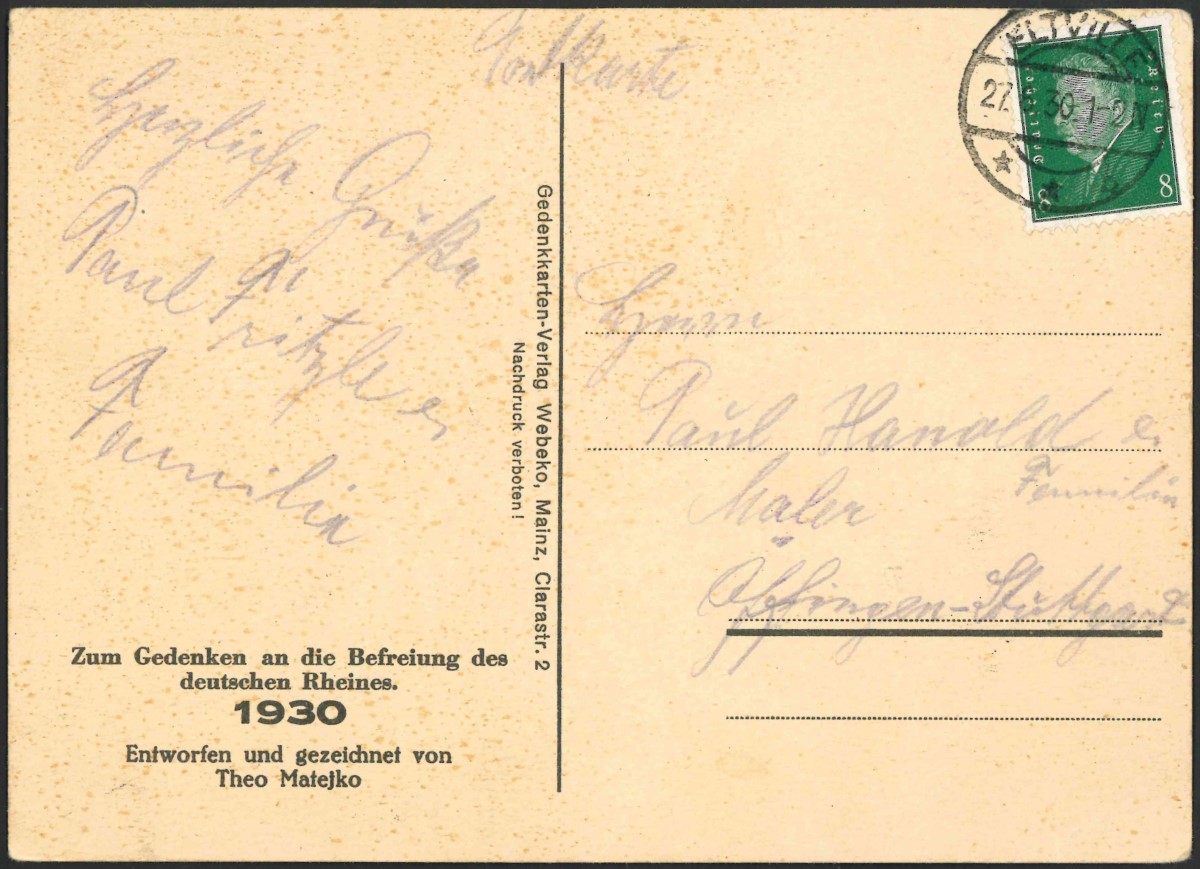



RHINELAND #2
'FREE FROM SHACKLES'
(Jun 1930)
This postcard features the head of a rather stern looking Gustav Stresemann (1878–1929), above the River Rhine, with a rising sun in the background. Stresemann was a statesman, German Chancellor in 1923, and Foreign Minister from 1923 until 1929. Stresemann negotiated the troop withdrawal in 1930.
The card is titled "Von Fesseln Frei!" - 'Free from the Shackles' and was published by Drei-Mussen-Verlag of Mainz. The reverse features the words to the song "Lied u. Marsch zur Rheinbefreiung" - 'Song and March for the Liberation of the Rhine' with words by Adalbert Arnold and music by Konr. Kroh.
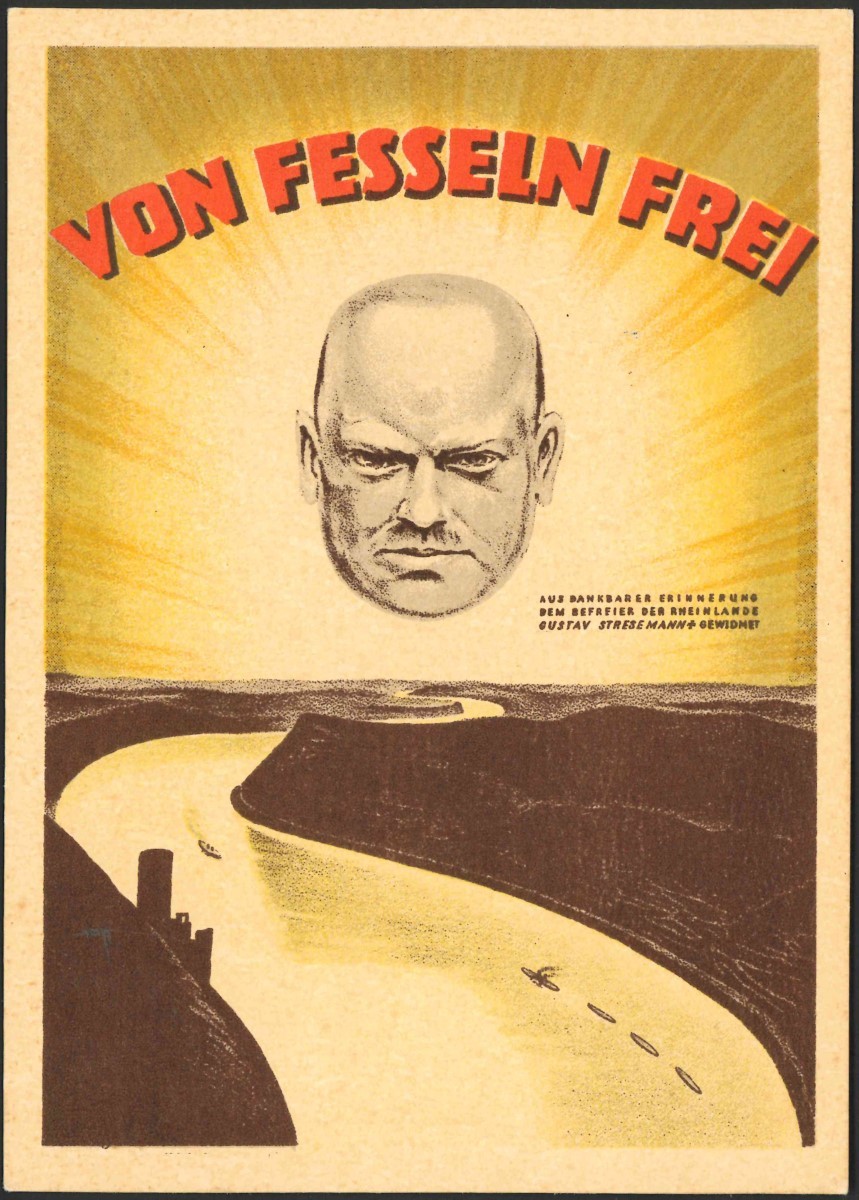



RHINELAND #3
'LIBERATION CELEBRATION'
(Jun 1930)
This more sombre looking postcard features a Reich Eagle and the dates 1919-1930 which covers the time period when the Rhineland was occupied by foreign troops. The card celebrates the liberation in the town of Kehl, on 6th Jul 1930, and the reverse side has a short history of the region up until 1919 under the heading "Der Wechsel | der staatlichen zugehörigkeit Kehls" - 'How the the state, belonging to Kehl, has changed'.




RHINELAND #4
'OUR RHINELAND IS FREE!'
(Jun 1930)
This postcard goes back to the floating heads theme as seen in No. 2 above. This time the heads are those of Stresemann and von Hindenburg, celebrated German soldier, statesman and President of Germany. The rising sun once again makes an appearance, and now there is the addition of a hammer and chisel, as the chains of the Rhinelands bondage are broken assunder. Once again the River Rhine is foremost in the image, with various well known landmarks on each bank of the river. Dramatic stuff.
This particular example features the special stamp released to commemorate the occasion, and as with No. 1 above, it was cancelled in Mainz.







RHINELAND #5
'FREE IS THE RHINE'
(Jun 1930)
Once again the Rhine, the rising sun and the national flag are used to good effect on this commemorative postcard by Verlag Eduard Theile of Ludwigshafen am Rhein. Titled "Zur Erinnerung | an die Befreiung der besetzten Gebiete" - '
As a reminder | to the liberation of the occupied territories', it is another clarion call to celebrate the region's freedom.
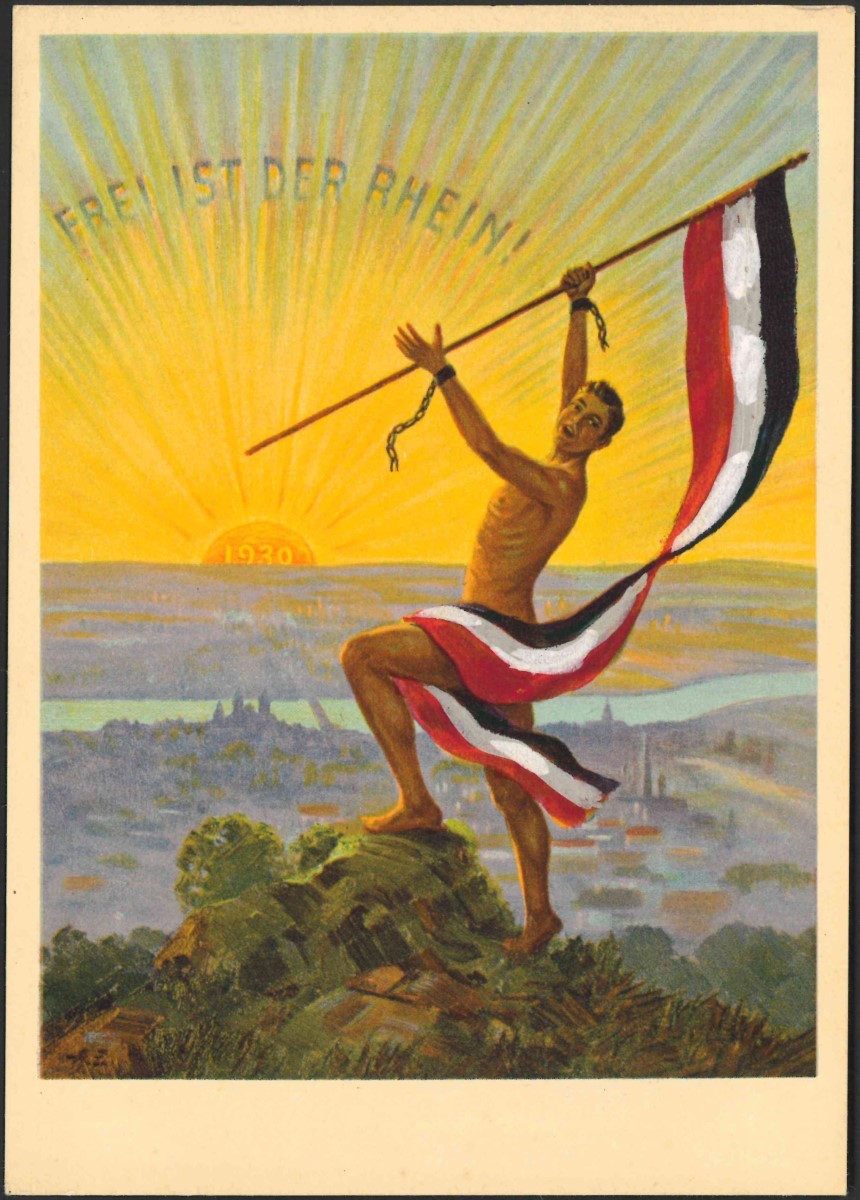



RHINELAND #6
'THEY SHOULDN'T HAVE IT!'
(Jun 1930)
This postcard from an unknown publisher takes a slightly different approach. A menacing-looking German Eagle is seen here chasing the foreign crows across the Rhine. The card is titled "Sie sollen ihn nicht haben, den freien deutschen Rhein!" - 'You will not have it, the free German Rhine!'
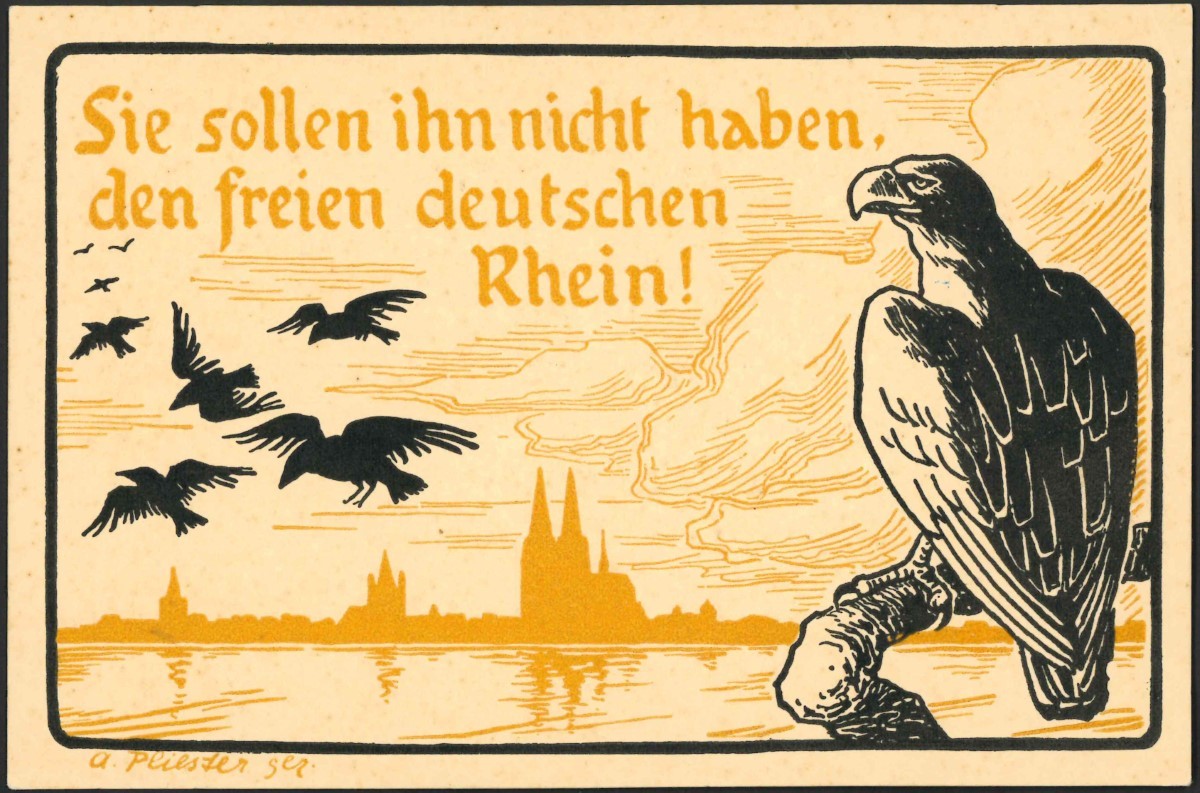



RHINELAND #7
'RHINELANDLIED'
(Jun 1930)
This patriotic card is titled "Rheinlandlied | 'Frei ist der Rhein!'" - 'Song of the Rhineland 'The Rhien is Free!' and is based on the poem 'Song of the Rhine' or "The Palatinate Song" with original text by Eduard Jost (1869) and the melody by Emil Sauvlet (1877). In this case the words to the poem have been changed by Oskar Mener=Elbing (1866–1938), German painter and writer.
This card was published by Verlag J. Destreicher of Wiesbaden and this particular card was posted in Wiesbaden on 1st Jul 1930.
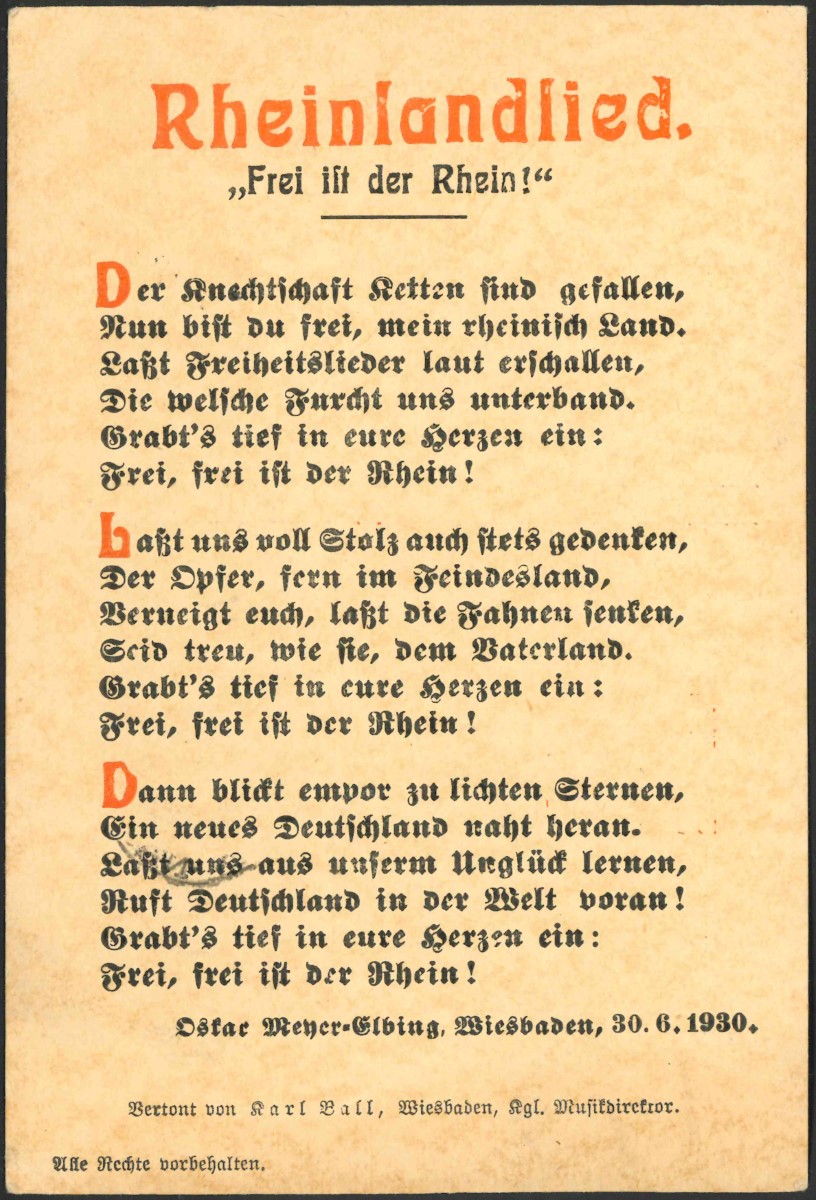


The words to the original song are as follows with the revised version on the right:
On the German river, on the green Rhine, you pull yourself out, O Palatinate!
How do you smile in your spring decorations, how the stream waves the silver ribbon!
There I stand on the top of the mountain and look at you in sweet peace,
and cheering my heart calls out:
O Palatinate, how beautiful you are! O Palatinate, how beautiful you are!
The salvation of bondage has fallen,
You're free to run, my Rhineland country.
Let freedom songs ring out loud
The French fear stopped us.
Dig deep into your heart:
The Rhine is free, free
From your gentle hills the vine nods to me in the sunbeam,
the green of your forests lures me, the glory of the meadows in every valley.
The Sunday
and cheering my heart calls out: bell rings from your churches and chapels, and devotion and enthusiasm whisper:
O Palatinate, how beautiful you are! O Palatinate, how beautiful you are!
Let us remember the full story,
The victims, far away in enemy territory,
Bow down, lower the flags,
Stay loyal, like her, to the fatherland.
Dig deep into pure hearts:
Free. the Rhine is free!
And the gray ruins of your castles and the proud structure of your cathedral,
how they greet me in the sun gold from the mountain and from the meadow!
It draws me to their rooms, it drives me to their halls,
and as I wander it sounds joyful:
O Palatinate, how beautiful you are! O Palatinate, how beautiful you are!
Then look up to bright stars
A new Germany is approaching.
Let us learn from our bad luck
Call Germany forward in the world!
Dig deep into your heart:
The Rhine is free, free!
Yes, you are beautiful, oh little piece of earth on the German river, on the green Rhine,
you land full of honesty and loyalty, you land in the spring sunshine!
And if I once find in your lap, O Palatinate country, the blessed peace,
then I call with the last breath:
O Palatinate country, how beautiful you are! O Palatinate, how beautiful you are!

RHINELAND #8
'HINDENBURG/RHINELAND'
(Jun 1930)
This postcard is entitled "Deutschen Gruss vom Hindenburg Tag am Deutschen Rhein" - 'German greetings from Hindenburg Day on the German Rhine'.
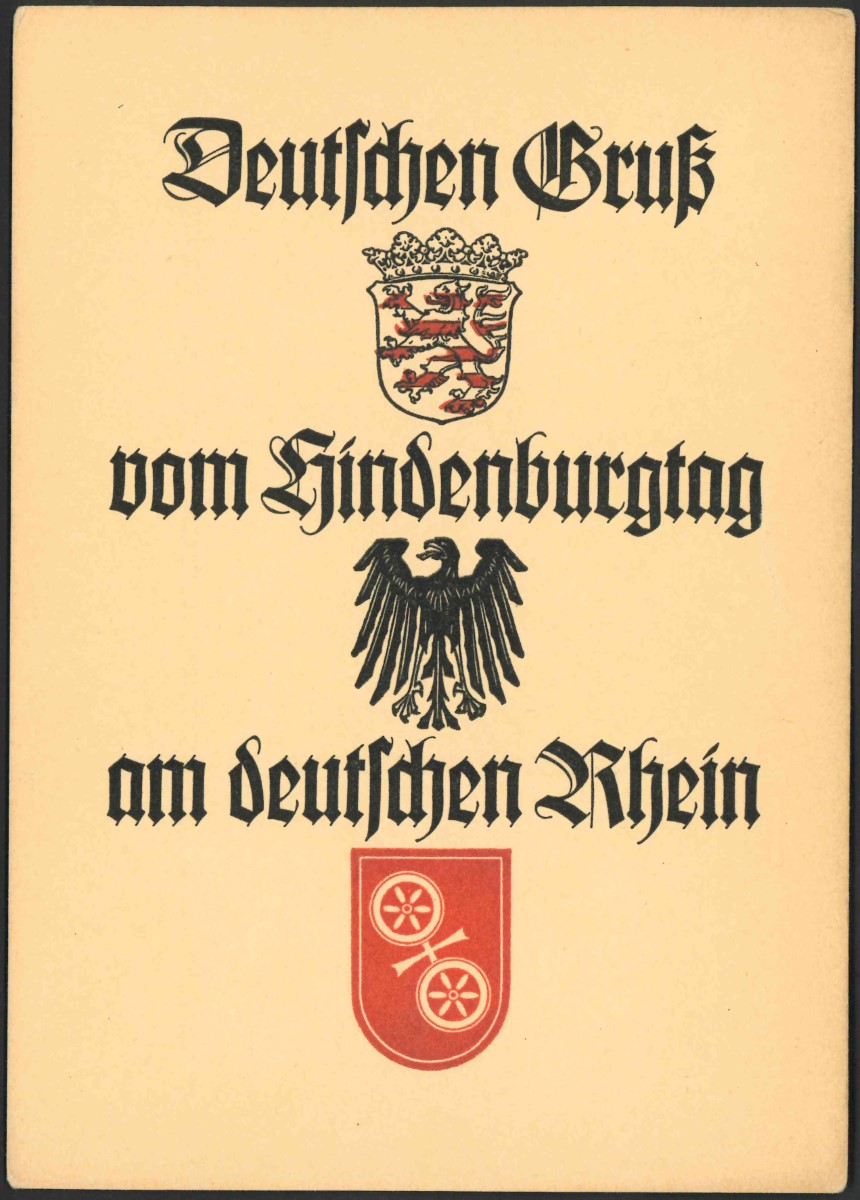
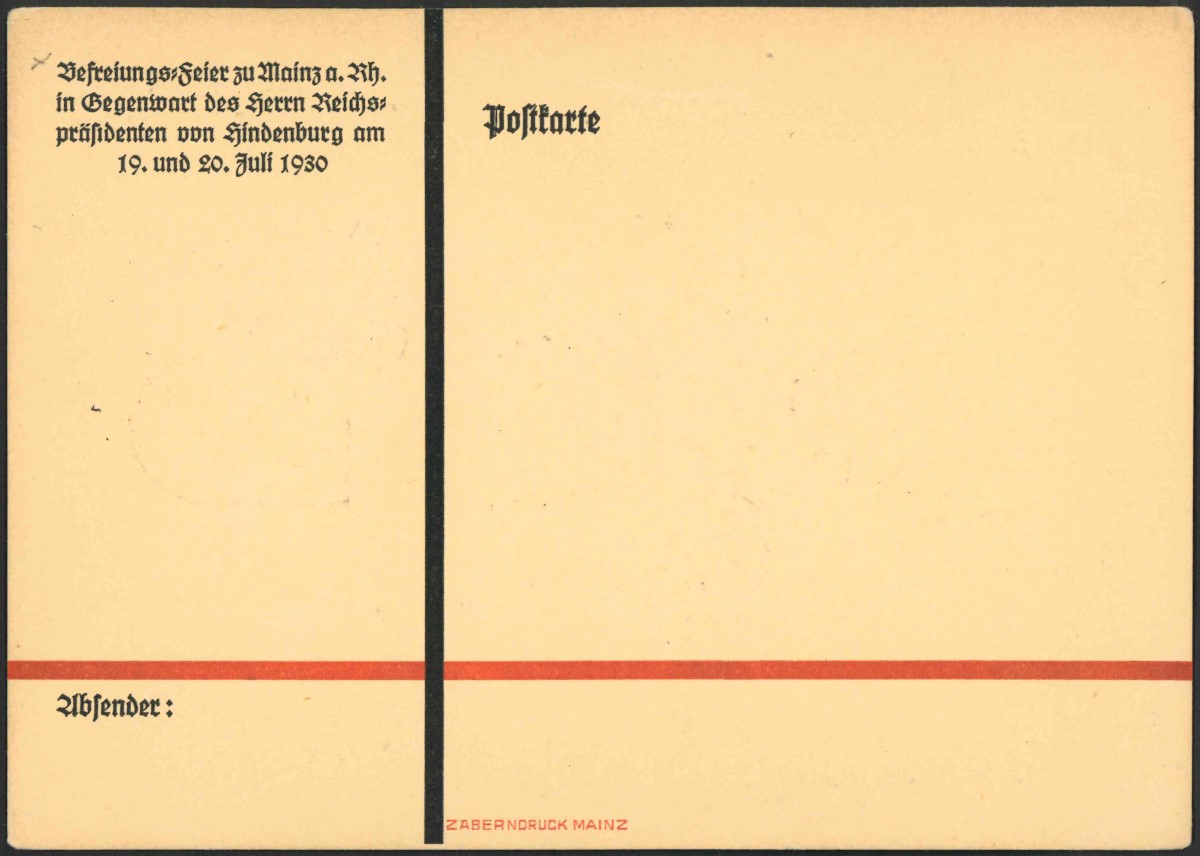

The text on the reverse of the card reads:
Befreiungs=feier zu Mainz a. Rh.
in Gegenwart des herrn Reichs=
präsidenten von Hindenburg am
19. und 20. Juli 1930"
Liberation celebration in Mainz on the Rhine
in the presence of the Reich=
President von Hindenburg on
July 19 and 20, 1930'

RHINELAND #9
'THE RHINE IS FREE'
(Jun 1930)
This patriotic postcard was published by Verlag Holstinsky in Wiesbaden and like the previous examples has a few lines of patriotic text.

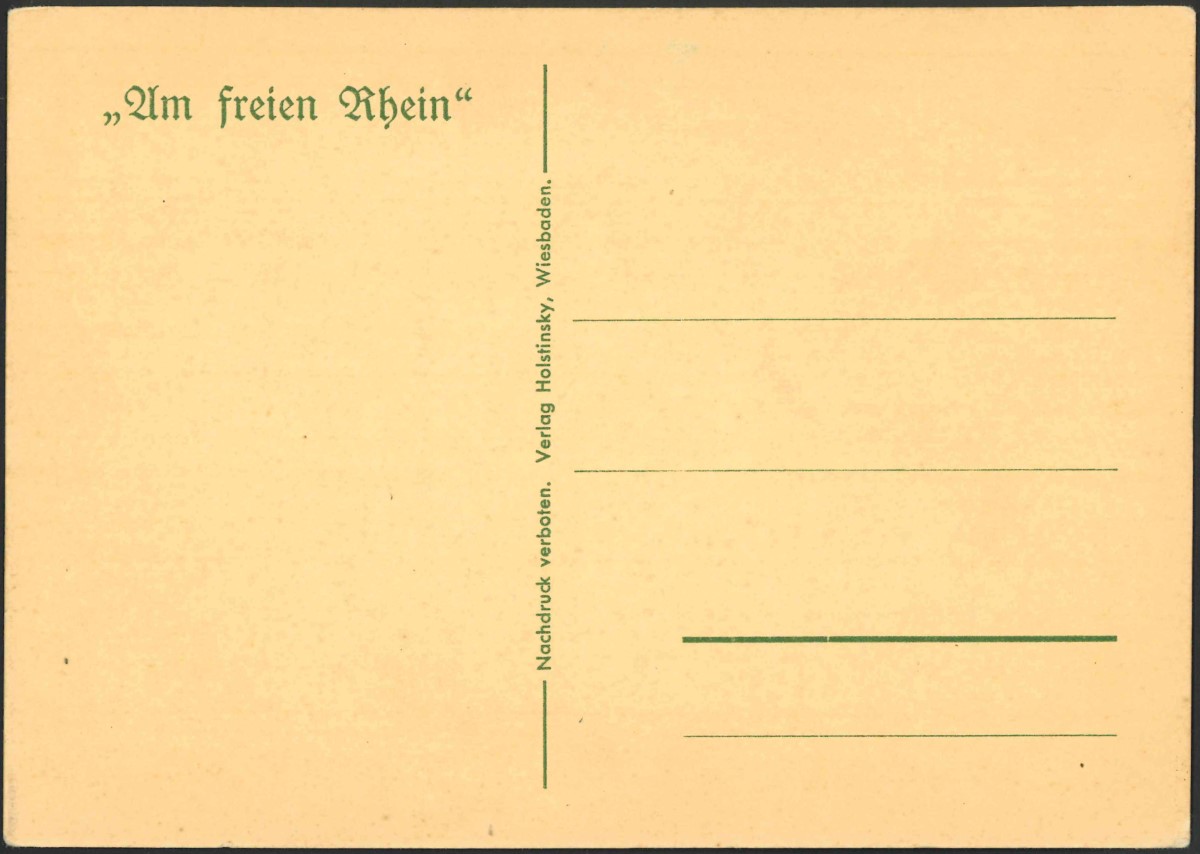

The text on the front of the card translates as follows:
Lasst die Freudenfeuer
auf den Bergen leuchten!
Leiden, ungeheur,
die uns ewig deutschen,
sind vergessen und vorbei!
Und in deutschen Städten,
über deutschen Bauen
jubeln deutsche Männer,
jauchzen deutsche frauen:
Der Rhein ist frei!
Leave the bonfires
shine on the mountains!
Suffering, tremendous,
who will forever Germans
are forgotten and over!
And in German cities
over German buildings
cheer German men,
cheering german women:
The Rhine is free!

RHINELAND #10
FREEDOM HOUR
ON THE RHINE
(Jun 1930)
Inscribed "1930 Die Freiheitsstunde am Rhein" - '1930 Freedom hour on the Rhine'. Yet another example of patriotic text on a postcard from an unknown publisher.

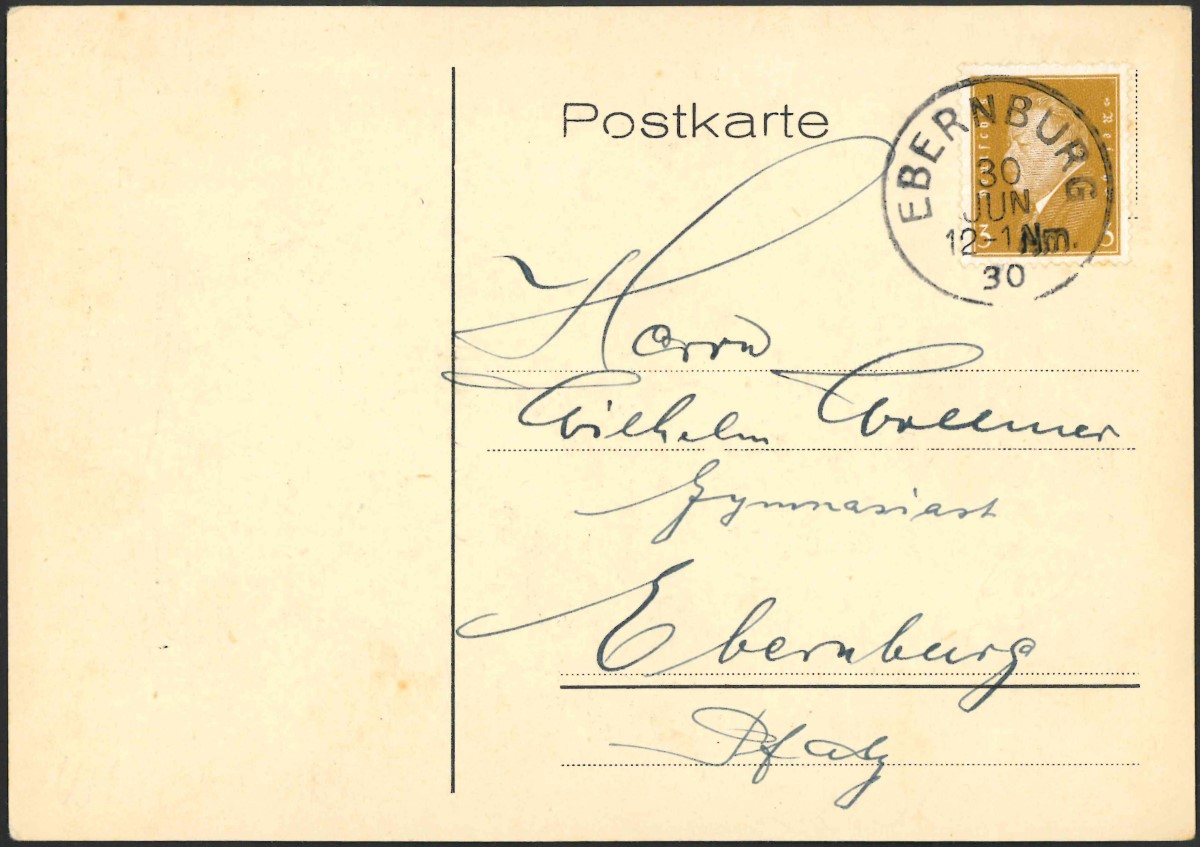

The text on this card is as follows:
Die Freiheitsstunde am Rhein.
Endlich nach so langen Jahren,
Schwerer Sorge, Not und Pein,
Fremder Willkürschaft - Gefahren,
Hier bei uns am deutschen Rhein,
Endlich ist der Tag erstanden,
Wo die Freiheitswoge wallt,
Wo im Westen deutscher Landen,
Froher Freiheitssang erschallt.
The hour of freedom on the Rhine.
Finally after so long years
Severe worry, distress and pain,
Foreign arbitrariness - dangers,
Here with us on the German Rhine,
The day has finally come
Where the waves of freedom roar
Where in the west of Germany
Happy singing of freedom resounds.
Die Glocken verkünden mit hehrem Klang,
Die frohe erhabene, heilige Stunde.
Zum Siege führte der Freiheitsdrang,
Wir hatten die Kämpfende Wahrheit zum Bunde.
Wir blieben deutsch in schwertster Zeit,
Trolz Sorge, Not und Qual,
Und blieben es auch in Ewigkeit,
Mit treuestem Herzen nach eigener Wahl.
The bells proclaim with a noble sound,
The happy, sublime, holy hour.
The desire for freedom led to victory,
We had the Warring Truth as our league.
We stayed German in the worst of times,
Proud of worry, distress and torment,
And stayed forever
With the most loyal heart of your own choice.
Frei ist das Volk und frei ist das Land,
Frei ist der deutsche Rhein.
Millionen reichen im Geist uns die Hand,
Und fröhlich schlagen wir ein.
Möge die Freiheit uns alle verbinden
Im gorssen deutschen Reich,
Möge die Zukunft uns recht bald verkünden,
Die Freiheit des Ostens vom irrenden Streich.
Free are the people and free is the land
The German Rhine is free.
Millions shake hands with us in spirit
And happily we strike.
May freedom unite us all
In the great German Empire
May the future announce us very soon
The freedom of the East from the errant strike.

RHINELAND #11
HINDENBURG and RHINE
(Jun 1930)
This patriotic postcard is from an unknown publisher and has the word "Drucksache" (printed matter) instead of "Postkarte" on the reverse side. The front of the card has yet another poem proclaiming the freedom of the Rhineland.

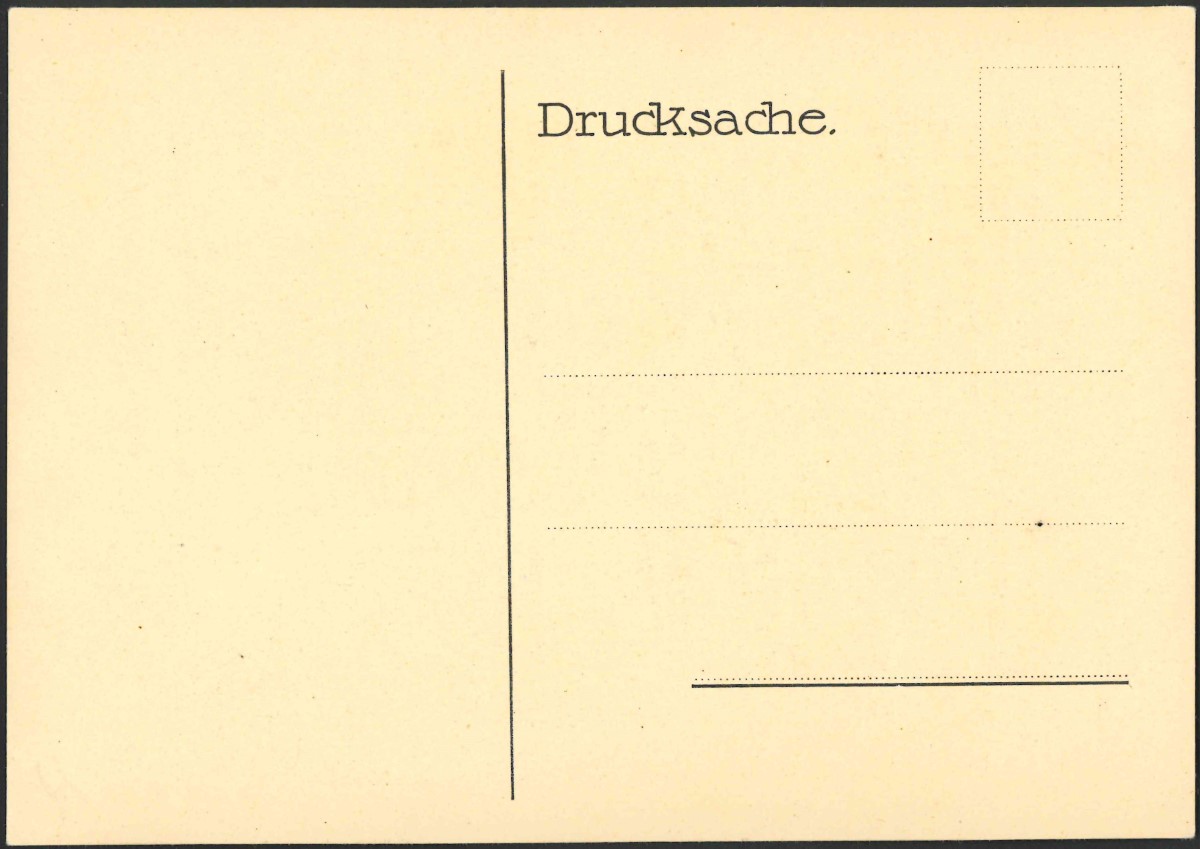

The poem reads as follows [my apologies for the poor translation]:
Mit Runen gezeichnet das greise Gesicht,
Draus gütig dein Leid um das Vaterland spricht,
So stehst du, das herz auf dem rechten fleck,
Als der deutsche held an dem Deutschen Eck
An dem freien Rheinstrom im freien Land,
Vom jubelnden Volke ein Vater benannt.
Heil Hindenburg!
The aged face drawn with runes,
Your sorrow for the fatherland speaks kindly,
So you stand, your heart in the right place,
As the German hero at the Deutsches Eck
By the free river Rhine in the free country,
A father named by the cheering people.
Heil Hindenburg!
Hoch droben vom massigen Felsenaltan,
Den jüngst noch beherrschte der gallische hahn,
Weht stolz in dem jauchzenden Windchore dir
Des Rheinlandes Gruss, unser Reichspanter,
Und des Landes Glocken rings stimmen mit ein:
"Frei ist unser Rheinland und frei ist der Rhein!
Heil Hindenburg!"
High up from the massive rocky altan,
The Gallic rooster ruled the last one,
Blow proudly in the exultant wind choir
Greetings from the Rhineland, our Reichspanter,
And the bells of the land join in:
"Our Rhineland is free and the Rhine is free!
Heil Hindenburg!"
Ein jedes herz treu die entgegenschlägt, Der auf alten Schultern die Bürde trägt,
In heiligem, unentwegtem Vertraun
Dar Reich zu schirmen und aufzugbaun,
Und magst du auch scheinbar Berfall heute sehn,
Dein Deutschland wird nimmermehr untergehn.
Heil Hindenburg!"
Every heart that strikes faithfully
Who bears the burden on old shoulders
In holy, unrelenting trust
To shield and build the kingdom,
And may you seem to see a raid today,
Your Germany will never go under.
Heil Hindenburg! "
Was dein Heist, vor dem es dem Feinde graust,
Und dein Schwert in der starken Männerfaust
Uns als höchstes dein Opfer für uns vollbracht,
Des sei bis in ewigkeit dankbar gedacht.
Wir schwören am freien, am deutschen Rhein,
Dem Vaterland all unsre Kräfte zu meihn!
Heil Hindenburg!
What your heist, of which the enemy is dreading,
And your sword in the strong man's fist
Made us as your highest sacrifice for us,
That is to be thought gratefully for eternity.
We swear by the free, by the German Rhine,
To give the fatherland all our strength!
Heil Hindenburg!

RHINELAND #12
FREI IST DER RHINE
(Jun 1930)
This artist's drawn postcard features three heralds riding their steeds throughout the land, proclaiming to the masses that the Rhineland is free!!.



RHINELAND #13
FREI IST DER RHINE
(Jun 1930)
This postcard was drawn by artist G.W. Schwenzer and has a similar feel to the earlier postcards. The 'German Eagle' is seen flying free over the River Rhine, with broken chains lying on the ground below, signifying the region's new found freedom. The inscription reads "ZUM ANDENKEN AN DIE BEFREIUNG DES RHEINLANDS JULI 1930" - 'IN MEMORY OF THE LIBERATION OF THE RHINE JULY 1930'




RHINELAND #14
'FREE IS THE RHINE'
(Jun 1930)

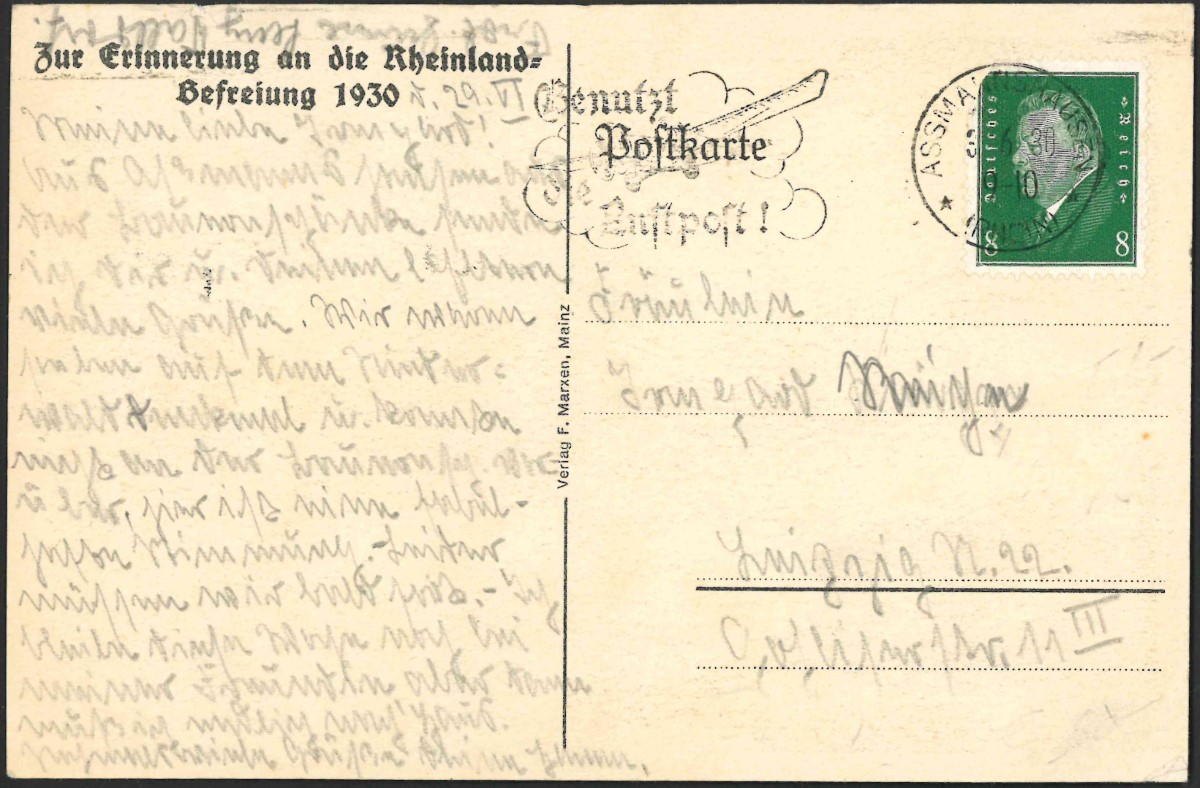


RHINELAND #15
MAP OF THE RHINELAND
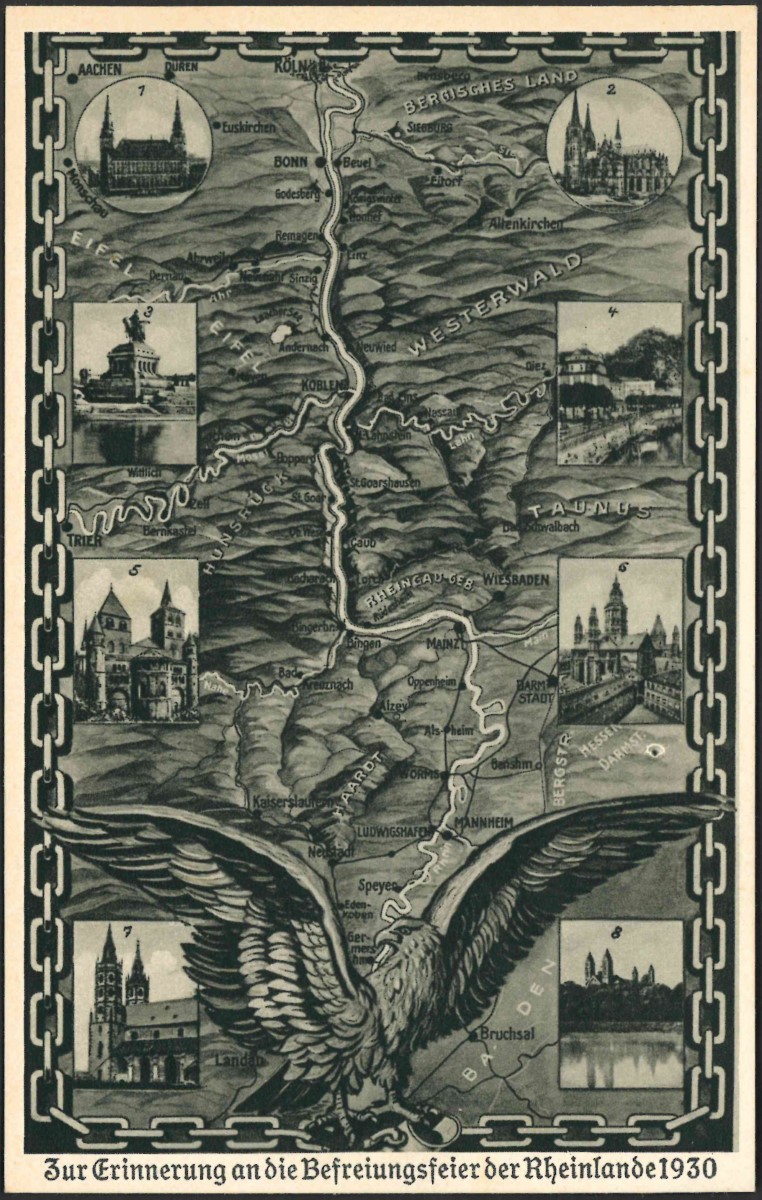
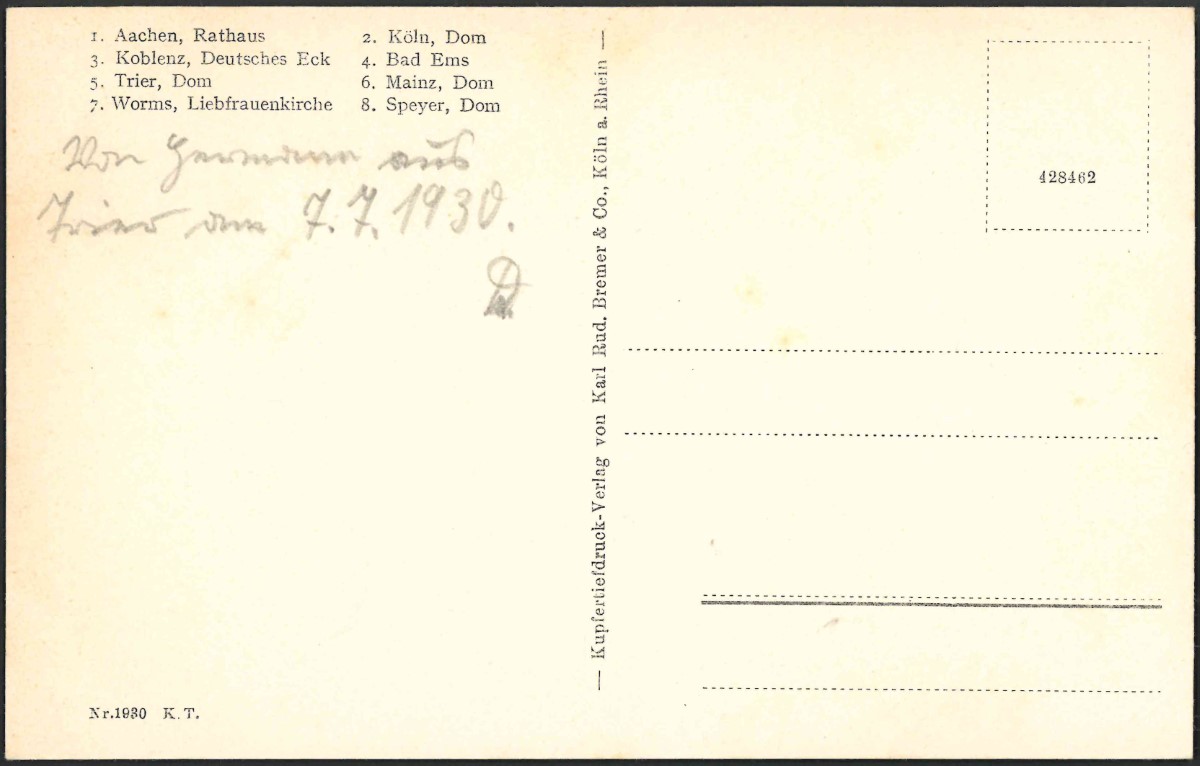


RHINELAND #16
FREI IS DER RHEIN




RHINELAND #17
FREI IS DER RHEIN

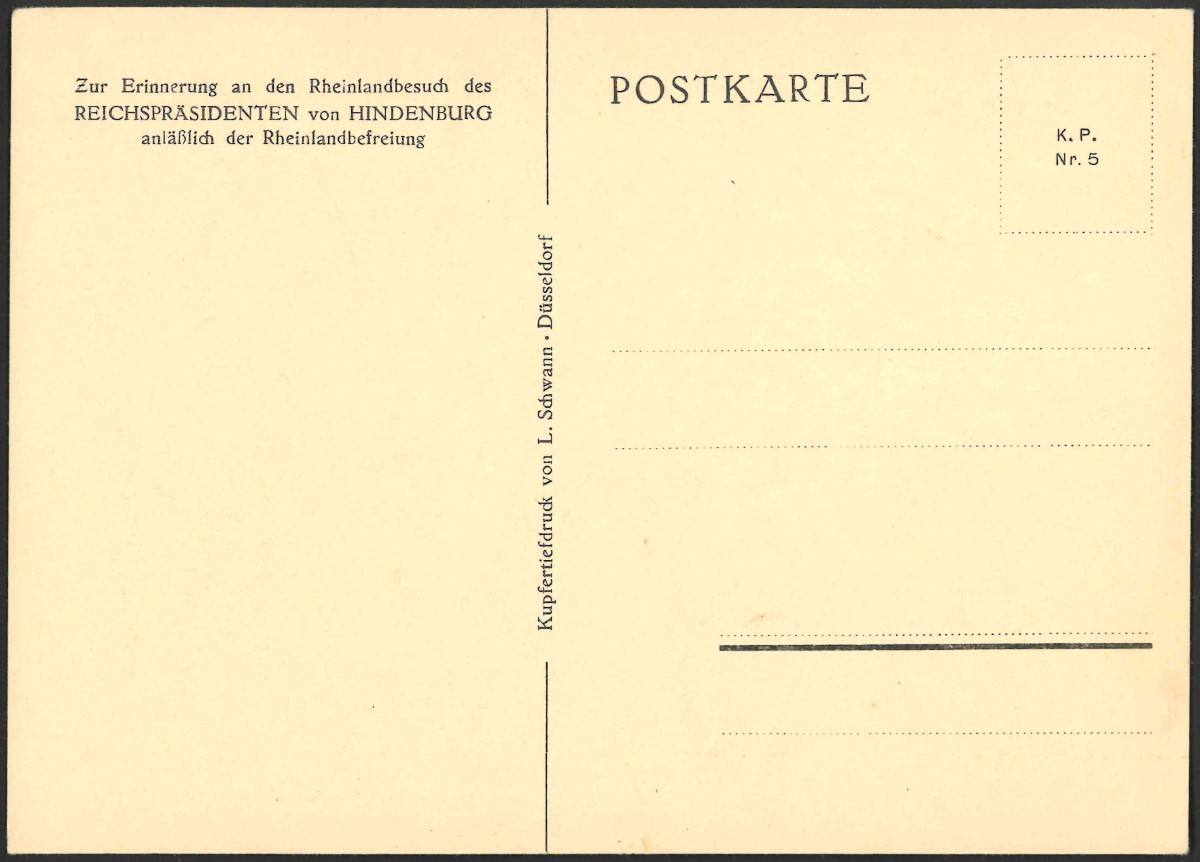


RHINELAND #18
DER RHEIN IST FREI
This song card was published by Verlag von Karl Rud, Bremer & Co., Köln am Rhein and features images of the Cologne and Mainz Cathedrals separated by a large bell.
The example below was cancelled in KASSEL on 26th Jul 1930.
